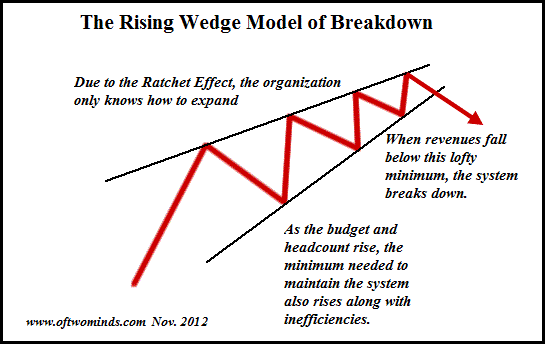When organizations are incapable of reforming themselves, breakdown is the only possible endpoint.
Every failing organization, from empires to school districts, responds to its embarrassingly visible failure by proclaiming one reform after another. To take but a few from a long list, China is "reforming" its hopelessly corrupt, debt-based central-planning economy, President Obama is "reforming" the Global Surveillance State (into a presumably kinder, gentler machine gun hand?), The European Union is "reforming" its banking sector and the overly complex U.S. Sickcare system is being reformed with 2,300 pages of additional complexity under the Orwellian title of Affordable Care Act (ACA), a.k.a. ObamaCare.
The one dynamic that matters is of course left unsaid: the inability of the Status Quo to reform itself, i.e. undertake fundamental, systemic reforms. This inability has many facets but only one root: political sclerosis caused by entrenched, vested interests seeking to protect their perquisites and power.
This is as true of local school districts as it is of entire states.
Here is my scale-invariant summary of the Status Quo:
1. An economy that is controlled by the government is one in which political power, not the market, controls the distribution of national income. Politics is the arena in which the national income is distributed. The primary contestants are entrenched, vested interests seeking to protect their perquisites and power.
2. A government in which political power is for sale to the highest bidder puts the wealthy at an extreme advantage, as they have the means to buy political power to conserve and expand their share of the national income.
3. In order to do the bidding of the financial Elite, the political Elite redistributes enough national income to the bottom 50% and retirees to buy their silence/complicity.
4. A nation in which political power is for sale is one in which the rule of law is bent to serve those with power.
That the relentless advocacy of one’s own interests magically creates a common good is the core of our secular faith; what if this is false? This is not just the secular faith in America, but in China; "to get rich is glorious" implicitly embodies a "trickle down" economic view in which Chinese millionaires whose sons own multiple $250,000 autos are good for China because that extreme concentration of wealth will supposedly trickle down to everyone lower in the food chain.
Orwell called this "some are more equal than others": in other words, beneath the glossy PR veneer of trickle-down economics, the super-wealthy are entitled to their wealth by the natural order of inequality. Never mind the system is rigged in their favor; they "deserve it" in the same way that feudal lords "deserved" their estates.
In Nature the ability to reform is called adaptation. Organisms and species that are unable to adapt when selective pressure is applied vanish from the Earth. Humans and human organizations are no different; individuals and organizations that are unable to respond to selective pressure with real self-reform/transformation will also fail and disappear.
The political and financial Status Quo is incapable of true reform, because real reform threatens the perquisites and power of entrenched vested interests, what I call fiefdoms.
The other dynamic I have described is the Rising Wedge Model of Breakdown:entrenched interests within organizations only know how to expand, and this leads to ever-higher minimum levels of funding and headcount. Reform is rendered impossible because the organization breaks down once funding dips below the lofty minimum.
If we combine these three dynamics--the relentless, single-minded advocacy of self-interest in rigging the system; a multiplicity of political "third rails," i.e. constituencies and fiefdoms that are politically untouchable, and the Rising Wedge Model of Breakdown, we understand why the Status Quo is incapable of reforming itself.
That leaves breakdown as the only possible endpoint.
Though the Status Quo still has enough resources to put off the eventual breakdown and collapse for a while longer, I expect an initial crisis to emerge in 2014-2015 that is resolved by the usual politically expedient half-measures. The sigh of relief that "everything's been fixed" may last two to three years to 2017-18, and then the ultimate crisis will gather force until it is beyond half-measures, likely in the 2021-22 timeline.
For more on the same topic:
Things are falling apart--that is obvious. But why are they falling apart? The reasons are complex and global. Our economy and society have structural problems that cannot be solved by adding debt to debt. We are becoming poorer, not just from financial over-reach, but from fundamental forces that are not easy to identify or understand. We will cover the five core reasons why things are falling apart:
 1. Debt and financialization
1. Debt and financialization
2. Crony capitalism and the elimination of accountability
3. Diminishing returns
4. Centralization
5. Technological, financial and demographic changes in our economy
Complex systems weakened by diminishing returns collapse under their own weight and are replaced by systems that are simpler, faster and affordable. If we cling to the old ways, our system will disintegrate. If we want sustainable prosperity rather than collapse, we must embrace a new model that is Decentralized, Adaptive, Transparent and Accountable (DATA).
We are not powerless. Not accepting responsibility and being powerless are two sides of the same coin: once we accept responsibility, we become powerful.
Kindle edition: $9.95 print edition: $24 on Amazon.com
To receive a 20% discount on the print edition: $19.20 (retail $24), follow the link, open a Createspace account and enter discount code SJRGPLAB. (This is the only way I can offer a discount.)
| Thank you, Max M. ($5/month), for your astonishingly generous re-subscription to this site-- I am greatly honored by your steadfast support and readership. |

 1. Debt and financialization
1. Debt and financialization


























